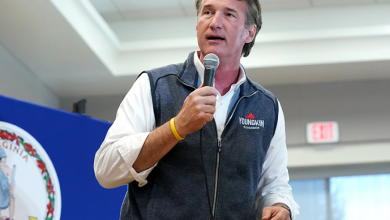PACT Act’s passage brings ray of hope for Hampton Roads veterans

Following a delay of several days, the Honoring our Promise to Address Comprehensive Toxics (PACT) act, which would expand VA access for health conditions related to toxin exposure for up to 3.5 million veterans, is set to become law.
The bill would help veterans who suffer from medical conditions as a result of exposure to burn pits — massive holes filled with plastic, rubber and human waste, covered in jet fuel and set on fire — and other hazardous waste materials.
U.S. Rep. Elaine Luria, D-Virginia Beach, , a member of the House’s Committee on Veterans Affairs and chair of the House Subcommittee on Disability Assistance and Memorial Affairs, said the program will be especially effective in Hampton Roads, where an estimated 17% of her constituents are veterans, many of whom served in the Gulf, Iraq and Afghanistan wars in which burn pits were commonly used to dispose of waste.
Many veterans had difficulties receiving VA coverage — with up to 80% of applicants for treatment from conditions related to burn pits being denied. By introducing specific service locations and health conditions in the bill, Luria said she hopes care will become more accessible to veterans who served in the Middle East.
“The VA is process has just made it too hard, because order to get the health care, in most situations, you have to prove that it’s the health conditions connected to your service,” Luria said. “There’s really no way for somebody who served in Iraq or Afghanistan, where these burn pits were burning 12 hours, 24 hours a day, and they were breathing in the smoke — they can’t necessarily, prove that there was a burn pit. They can’t necessarily prove what chemicals they were exposed to.”
Steve Kudrick, a 20-year Navy veteran living in Hampton, said he remembers the stench of burning flesh from burn pits in East Africa and the black smoke that filled his lungs as he warned fellow servicemen of chemicals, tents and plastic at a Camp Boston fire in Afghanistan.
“It was reported on the news a bunch, and nothing was done for any of us,” Kudrick said. “We lived in tents and shipping containers and we were all exposed. Everybody had bloodshot eyes — eyes are all itching and burning, coughing up phlegm, blood and everything else, constant runny noses. No one really cared. That was just what we had deal with.”
Kudrick said he has not been able to receive care for some conditions he has experienced since returning home, such decreased lung function, which he attributes to the smoke. Kudrick, 43, is sleeping with a CPAP machine, washing his sinuses out three times a day and dealing with allergies he didn’t have before going to war.
But due to a paperwork issue, he was never added to the burn pit registry, and has not been able to receive VA treatment for these issues.
Hal Roesch, a Hampton resident and former VFW commander in chief, said the 80% rate of denial for veterans who apply to be treated for burn-pit related conditions is in part due to the current system’s reliance on the VA as “judge and jury” when it comes to allocating care. Despite the positive experiences many veterans have with receiving “very good” care, he said, unregulated issues like burn pits put the VA in a difficult spot, especially as large numbers of service members who served in Afghanistan and Iraq experience more serious effects of exposure over time.
“When we’re starting to look at the disabilities of our servicemen and women that are serving, that comes from the VA budget.” Roesch said. “When you have an organization that has to adjudicate disabilities on one hand looking out for veterans and then on the other hand, saying we got to pay for this when we do it, and it’s kind of like there are angels and devils on its shoulders. One side is saying ‘You got to do this, you know it’s right,’ And other one’s saying ‘Well, how the hell am I gonna pay for it?’”
Kudrick is happy with the care he receives at the VA for injuries unrelated to his experience with burn pits. But based on a track record of not being treated for cardiorespiratory illness, he fears even this legislation won’t ensure that all veterans like him get treatment.
Tuesday’s Senate vote came after days of backlash following a vote late last week in which only eight Senate Republicans voted to move forward on the bill after 34 Republicans had voted in favor of it in mid-June. While Republicans called for changes to the bill’s mandatory spending, Democrats and veterans advocates criticized the delay as retaliation for the recent climate change legislation deal. Luria said only minor changes to the bill have been made since June.
Roesch said the increased cost of veterans health care should not be a surprise to lawmakers.
“Every time we’ve had a conflict, and every time we’ve had a war, we come back and the politicians will be the first to tell you that we spent this many billion or this many trillion dollars on this war,” Roesch said. “The fact of the matter is that wasn’t the cost of the war, because the cost of the war has to include taking care of the warriors that we sent to the war.”
Luria championed two provisions in the package — one includes lists of service locations that would qualify a veteran for benefits and a list of illnesses resulting from exposure to airborne toxins, and one that seeks to speed and digitize notification of benefit eligibility.
“Congress authorizes military action overseas, and with that responsibility, there’s also a responsibility for us to make sure that resources are there,” Luria said.
This bill isn’t unprecedented, she said — it looks to provide care similar to that of Agent Orange survivors in Southeast Asia — and no major changes were made since it was last passed by the Senate.
Kudrick said he hopes the legislation will create a path for children of service members, such as his 10-year-old daughter, to receive treatment if medical conditions from their parents’ toxic fumes are passed down. But he said he is still skeptical of claims that he may have a better shot at receiving treatment — the politicization of the bill has made him wonder whether politicians will continue to support consistent, expensive care to people like him.
“Looked at what happened with all of them — ‘Oh, there’s just not money in the budget for it.’ We’ll be forgotten about until the next time it’s election time, and suddenly it’s going to become a hot ticket item again,” Kudrick said. “Then we will be forgotten again.”




